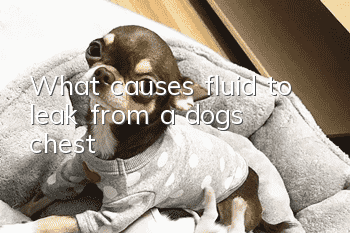What causes fluid to leak from a dog’s chest?

Fluid leaking from a dog's chest may be caused by pregnancy, false pregnancy, mastitis, pleural effusion, etc. First of all, if the dog has been bred and white fluid comes out of the chest, it is likely to be milk, which is a normal phenomenon of pregnancy, and the owner needs to be prepared to deliver the baby. Secondly, if the dog is not bred, it may be caused by false pregnancy. It is recommended to take the dog to the pet hospital for examination and confirmation. In addition, if the fluid coming out of your dog’s chest is thick or smelly, it is likely mastitis and needs timely treatment. Finally, pleural effusion can also cause symptoms such as fluid leakage from the chest and difficulty breathing, requiring X-rays and B-ultrasounds to confirm the diagnosis.
1. Pregnancy
If the dog has been bred and white fluid leaks from the chest, it is likely to be milk. Because the dog's mammary glands will increase in late pregnancy and will secrete milk when they are about to give birth. This is a normal phenomenon and indicates that the dog is about to enter the labor stage, so owners need to pay attention to observe and take care of the dog recently and be prepared to deliver the dog.
2. False pregnancy
If the dog has not been bred recently and white milk leaks from the chest, it needs to be considered that the dog has false pregnancy due to hormonal disorders in the body. Because the symptoms of pseudopregnancy in dogs are very similar to the symptoms of pregnancy, such as increased abdominal circumference, increased appetite, reddened nipples, and milk secretion. Therefore, if the owner cannot tell the difference by himself, it is recommended to take the dog in time. The dog goes to the pet hospital for a B-ultrasound examination to determine whether the dog is falsely pregnant.
3. Mastitis
Under normal circumstances, the milk flowing out of the dog’s chest is usually white and clear liquid. If you find that the liquid flowing out of the dog’s chest is very viscous or smelly, It is likely that you have mastitis. If not treated in time, the inflammation is likely to continue to spread. Therefore, it is recommended that the owner take the dog to the pet hospital for examination and treatment in time, and provide care and medication as required by the doctor to restore the dog's health.
4. Pleural effusion
When a dog has pleural effusion, due to the accumulation of a large amount of leakage in the pleural cavity, fluid will flow out of the chest and difficulty breathing will occur. , listlessness, loss of appetite and other symptoms. However, these symptoms are not specific. The diagnosis of pleural effusion requires X-ray and B-ultrasound examination. Therefore, it is recommended that the owner take the dog to the pet hospital for examination as soon as possible.
- Symptoms and treatment of dog fever
- What is an Australian Cattle Dog? Australian Cattle Dog appearance characteristics and living habits
- What should I do if my dog won’t be petted? Petting training should start with the baby
- Introduction to dog hair cleaning tools
- Be patient when training your dog to sit down
- Dog neutering surgery diet care
- How to raise whippets
- What sounds are dogs afraid of and how to help dogs overcome the sounds they fear?
- A guide to what to do when training your Samoyed
- What should I do if my pet dog Husky is constipated?



